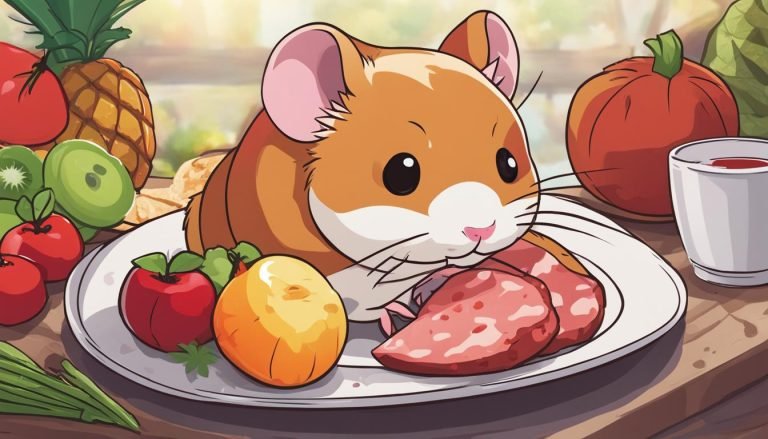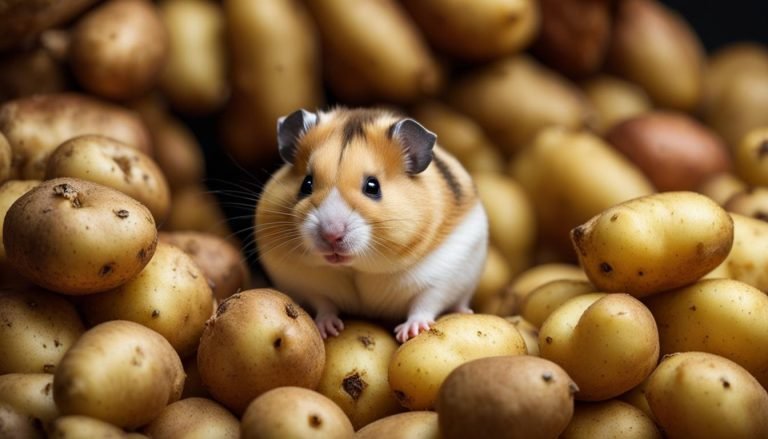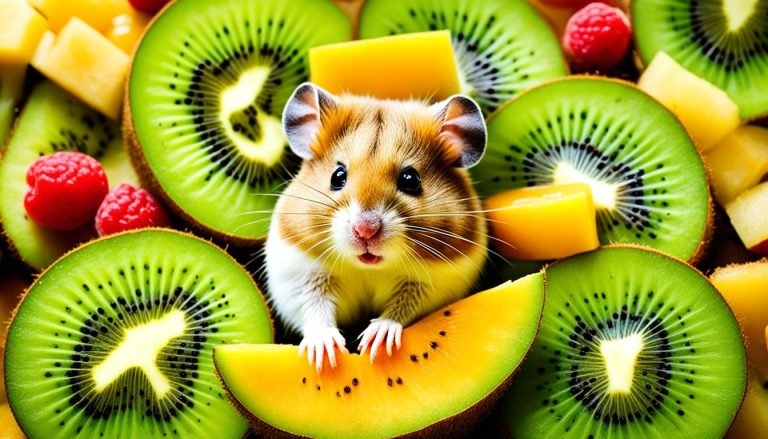Can Hamsters Eat Bell Peppers? Safe Feeding Tips
As a proud hamster owner, I always want to provide the best care for my furry friend. One of the questions that often comes to mind is, “Can hamsters eat bell peppers?”
After conducting some research, I’m happy to share with you the answer: Yes, hamsters can enjoy bell peppers! However, like any other food, it’s important to know how to incorporate it into their diet safely.
Bell peppers can be a nutritious addition to your hamster’s meals. They are safe for all hamster species and are packed with essential nutrients such as water, carbohydrates, protein, fiber, calcium, potassium, magnesium, phosphorus, and vitamin C. However, it’s crucial to understand that bell peppers should not be the main component of their diet. Instead, they should be given in moderation alongside a balanced diet of pellet feed, hay, seeds, nuts, fresh fruits, vegetables, and grains.
Key Takeaways:
- Hamsters can safely enjoy bell peppers as part of a balanced diet.
- Bell peppers provide essential nutrients, including vitamin C.
- Feed bell peppers in moderation alongside other hamster-friendly foods.
- Monitor your hamster’s intake and adjust accordingly.
- Remember to remove any uneaten or spoiled food from the cage.
Bell Pepper Nutritional Facts
Bell peppers are a nutritious addition to a hamster’s diet. They are low in calories and packed with essential nutrients that can support your hamster’s overall health. Red bell peppers, for example, contain a variety of beneficial components, such as:
- Water: Helps to keep your hamster hydrated.
- Carbohydrates: Provide energy for daily activities.
- Fat: Essential for the absorption of fat-soluble vitamins.
- Protein: Aids in tissue repair and growth.
- Fiber: Promotes healthy digestion and prevents constipation.
- Calcium: Supports the development and maintenance of strong bones and teeth.
- Potassium: Helps to regulate fluid balance and muscle function.
- Magnesium: Plays a role in nerve and muscle function.
- Phosphorus: Essential for bone health and energy metabolism.
- Vitamin C: Although not essential for hamsters, it can provide additional support during illness or stress.
Other colors of bell peppers, such as green or yellow, have similar nutritional profiles and can offer comparable benefits. However, it’s important to remember that bell peppers should be given in moderation due to their moderate sugar content and high water content.
To give you a visual representation of the nutritional value, take a look at this table:
With their combination of nutrients, bell peppers can be a healthy component of your hamster’s diet. However, it’s crucial to offer them in moderate amounts to maintain a well-balanced feeding routine.
Why Moderation Is Key

Bell peppers can be a nutritious addition to a hamster’s diet, but it’s essential to feed them in moderation. Due to their moderate sugar content, consuming too much bell pepper can disrupt the balance of a hamster’s diet and potentially lead to digestive issues. Additionally, sudden consumption of large amounts of vegetables, including bell peppers, can cause diarrhea in hamsters.
To ensure the well-being of your furry friend, it’s crucial to monitor their intake of bell peppers. Provide small, chopped pieces of bell pepper as an occasional treat, rather than a regular food source. By offering bell peppers in limited quantities, you can avoid potential health problems and maintain a balanced diet for your hamster.
Remember to remove any uneaten or spoiled food from the hamster’s cage promptly. This practice helps prevent health issues and ensures that fresh and safe food is always available. Alongside bell peppers, a well-rounded hamster diet should include a variety of hamster food, such as pellets, hay, seeds, nuts, fresh fruits, vegetables, and grains.
By following these feeding guidelines and offering a diverse range of hamster-friendly food, you can promote optimal health and happiness in your beloved pet.
Can Hamsters Eat Bell Peppers & Do They Like the Taste?
Anecdotally, most hamsters enjoy the taste of bell peppers. They find the crunchiness and juiciness appealing, but individual preferences may vary. Some hamsters may not show interest in bell peppers at all. It is important to observe the hamster’s reaction and adjust the amount given accordingly. Taste preference depends on the individual hamster.
If you’re introducing bell peppers to your hamster’s diet, start with a small piece and monitor their response. Some hamsters may eagerly munch on the bell pepper, while others may show little interest. Adjust the quantity accordingly, and don’t force your hamster to eat bell peppers if they don’t enjoy them.
Remember, variety is key in a hamster’s diet, so there are other safe vegetables you can offer if your hamster doesn’t show a liking for bell peppers. However, always consult a veterinarian or a trusted source to ensure you’re providing the best diet for your furry friend.
Final Thoughts
In conclusion, bell peppers can be a safe and nutritious addition to a hamster’s diet. While they should be given in moderation, they provide essential nutrients that contribute to a hamster’s overall health and well-being. However, it is important to monitor the hamster for any signs of digestive issues or allergies when introducing bell peppers into their diet.
Alongside bell peppers, it is crucial to offer a balanced diet that includes hamster food pellets, hay, seeds, nuts, fresh fruits, vegetables, and grains. This variety ensures that hamsters receive all the necessary nutrients for their optimal growth and development.
When feeding bell peppers to hamsters, it is recommended to offer small quantities and observe the hamster’s response. If any digestive issues or allergies are observed, it is advisable to discontinue feeding bell peppers and consult a veterinarian.
Remember, bell peppers are just one of the many safe vegetables that hamsters can enjoy. It is important to offer a diverse range of vegetables, ensuring they are appropriate for hamster consumption. By providing a balanced and varied diet, you can keep your hamster happy, healthy, and thriving.
Similar Posts
- Can Hamsters Eat Radish? Safe Pet Snacks Guide
- Can Hamsters Eat Pecans? Nut Safety Guide
- Can Hamsters Eat Kiwi? Nutritional Facts Guide
- Can Hamsters Eat Brussels Sprouts: Safe or Not?
- Can Hamsters Eat Rice? Safe Pet Feeding Tips
- Can Hamsters Eat Potatoes? Safe Snacks Explained
- Can Hamsters Eat Pistachios? Safe Snacks Guide
- Can Hamsters Eat Mushrooms? Safety Guide
- Can Hamsters Eat Mealworms? Safe Snack Guide
- Can Hamsters Eat Crackers? Safe Snack Tips.
- Can Hamsters Eat Asparagus? Safe Feeding Guide
- Can Hamsters Eat Peaches? Safe Snacking Tips
- Can Hamsters Eat Cilantro? Safe Herb Guide
- Can Hamsters Eat Cantaloupe? Find Out
- Can Hamsters Eat Avocado? Diet Safety Tips
- Can Hamsters Eat Pineapple? Safe Snack Guide







